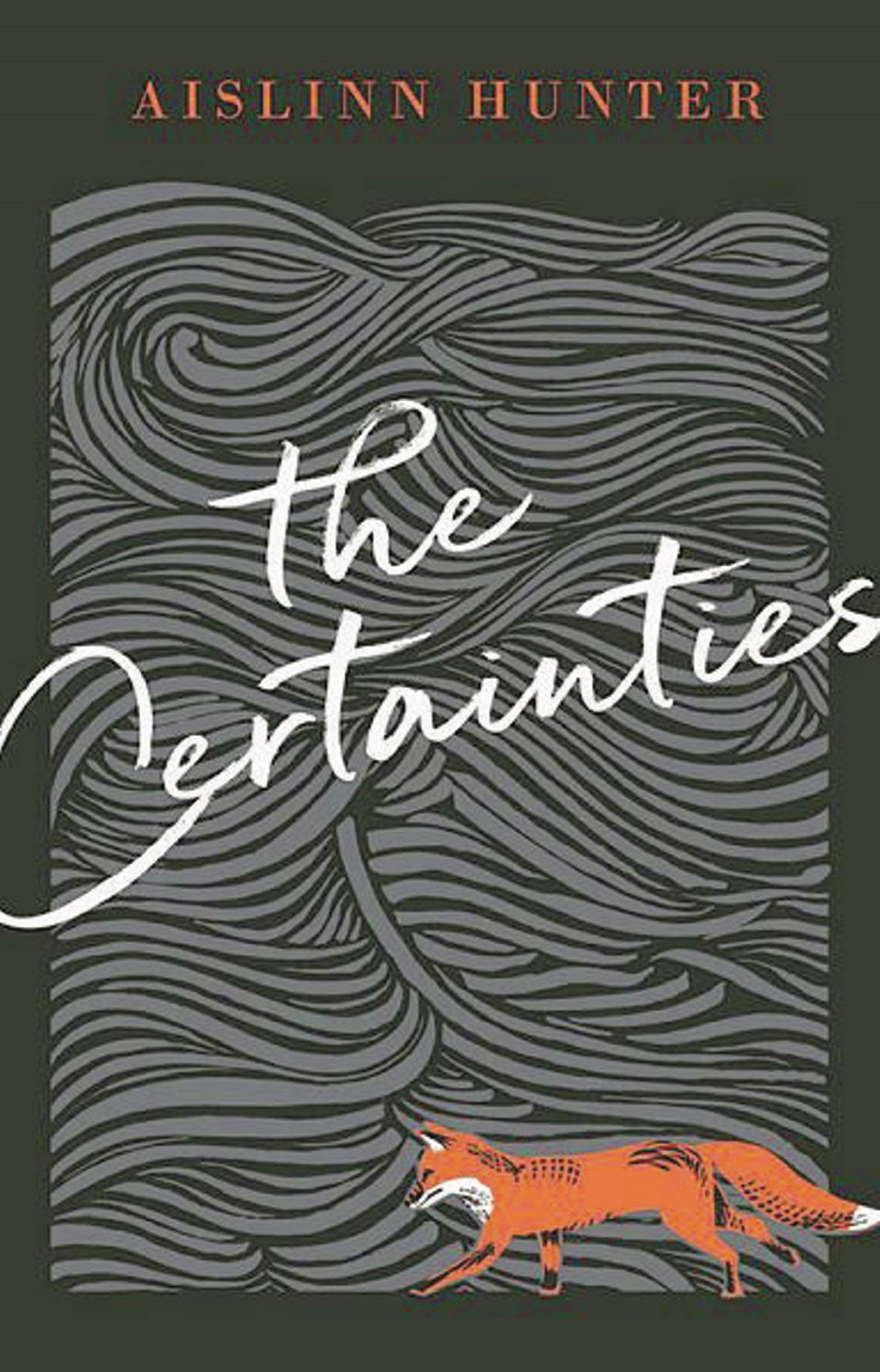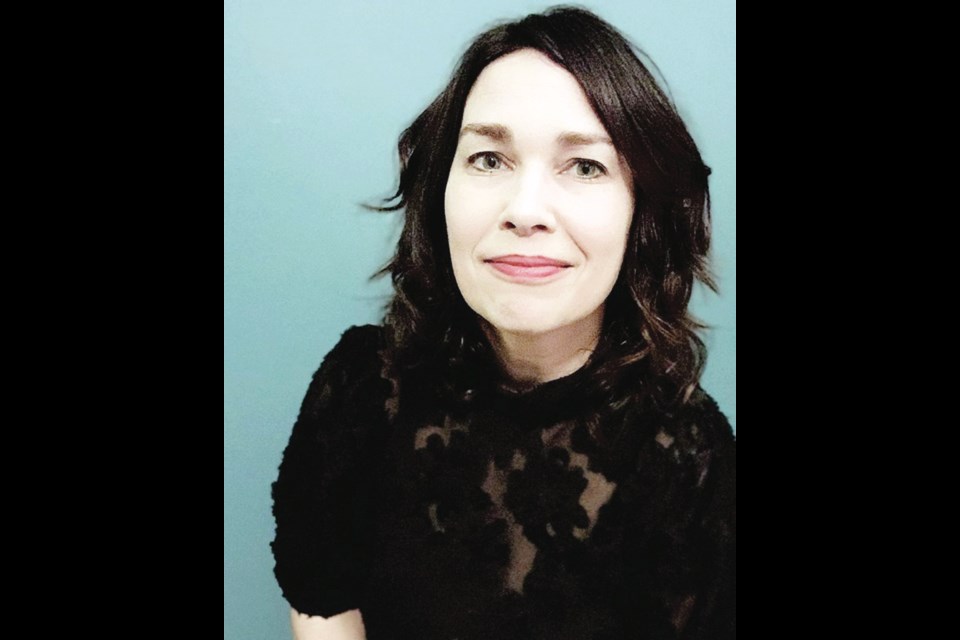When writer and poet Aislinn Hunter first set eyes on a finished copy of her new book, The Certainties, she began to sob.
The tears were prompted by a mix of joy and sorrow for the Vancouver-based Hunter, who spent five years writing the book. The University of Victoria graduate was celebrating the book’s arrival without her husband, Glenn Hunter, who died of brain cancer two months before The Certainties was completed, and it was clear the gravity of the situation had overcome her.
A video of the emotional moment was posted by Hunter to Twitter on July 20, without the slightest bit of unease or self-consciousness, according to the author. “I feel like we can learn so much from each other from human conversation, if we can let our guards down a little bit. People can say what they like about social media, but I felt so much support [for the video] as a writer trying to get to the page, but also as someone who is grieving. I’ve been really touched by the support.”
Writing is not an altogether speedy process for Hunter, who, by her own admission, labours longer than most when she’s writing; her acclaimed 2014 novel, The World Before Us, took 12 years from conception to completion. Though her seventh book is only 235 pages in length, Hunter, 50, said the process of writing The Certainties was relatively painless, considering what was going on in her life at the time.
Her husband, who was diagnosed with brain cancer in 2018, was healthy when Hunter began writing the book five years ago. He was quite ill when the book was nearing completion, however. Her publisher offered to delay the release of the book by a year, in order to allow Hunter to grieve, but she chose to honour the legacy of her husband by releasing it Aug. 4.
 “I didn’t want to stand next to the book for another year,” Hunter said. “I wanted to get it out. It will be a gift to talk about this book and engage with readers about this book. There is a lot of sorrow in it. But I want it to be useful to people.”
“I didn’t want to stand next to the book for another year,” Hunter said. “I wanted to get it out. It will be a gift to talk about this book and engage with readers about this book. There is a lot of sorrow in it. But I want it to be useful to people.”
The Certainties follows the real and imagined life of a girl named Pia whose story is deeply affected by war and fascism. It weaves historically accurate elements of Spain in the 1940s with a less-defined 1980s timeline that is set on a British island, near where a boat of migrants is stranded offshore. Tragedy and sadness are omnipresent. To reveal more about the story Hunter’s publisher, Knopf Canada, describes “as a love letter in the guise of a song of despair,” would be to rob the reader of The Certainties’ many twists and turns.
One of the characters uses storytelling as a way to work through his traumatic experiences, a practice known as bearing witness, which has become a key tenet of therapy and healing in the modern era. Hunter, who teaches creative writing at Kwantlen Polytechnic University in Vancouver, did not want to write about bearing witness without a tactile sense of what it feels like to be scared, so her initial plan involved joining a Canadian Forces mission in Iraq, Afghanistan, or Mali.
“I wanted to see something that I had to bear, so I had the idiot idea that in order to do that I should put myself in danger and be really scared,” Hunter said. “But I realized my gift wasn’t to be some obstacle on the front lines, where everyone is worried about this incompetent writer. My job was to take stories. To append.”
She eventually linked up with the Canadian Forces Artists Program, who sent her to Canadian Forces Base Suffield in Ralston, Alta., where she observed training exercises involving live biological, chemical, and radioactive weapons. She also did a lot of interviews with military and medical personnel, including some of whom had direct experience with chemical-weapon attacks.
Hunter, who was born in Ontario, is still using skills and approaches she collected as a creative writing and art history student at UVic in the mid-’90s. She studied under former UVic professors Jack Hodgins, Lorna Crozier, and Patrick Lane, celebrated authors who were also mentors and friends. “They were so genuine and fierce,” Hunter said. “These were not easy mentors to have, so a lot of us came out stronger writers from the kind of integrity and truthfulness in their engagements. You couldn’t get bad writing past them.”
It was a $250 writing award she received during her second year at UVic that put her on her path as a professional writer. “It was the first time in my life I had ever been recognized for anything. To be recognized was such a fundamentally transformative thing. From that time on, I worked really hard to be worthy of that kind of accolade.”
When she was writing her first book, Hunter learned she was a distant relative of Nobel Prize winner Alice Munro, who is a cousin of Hunter’s grandfather. They struck up a close friendship (Jim Munro was also a mentor, Hunter said). Novelist and playwright Timothy Findley was also an adviser of sorts, one of many notable writers to take an interest in Hunter’s career path. “I’m not convinced it was because I was brilliant,” she said with a laugh. “It was the spirit of the community at the time. I benefited from all of them tremendously.”
Hers is a non-linear journey, to say the least.
A high school dropout — she moved to Victoria in 1992 from Ireland, where she arrived at 17 after “flaking out” during her final year of high school — Hunter would go on to receive four university degrees, including her PhD from the University of Edinburgh. “The secret, dorky side of me is always looking for academic sparks to conjure books from. It’s been a really fruitful relationship for me. There wasn’t a day of my life I studied something I wasn’t actually keenly curious about.”



